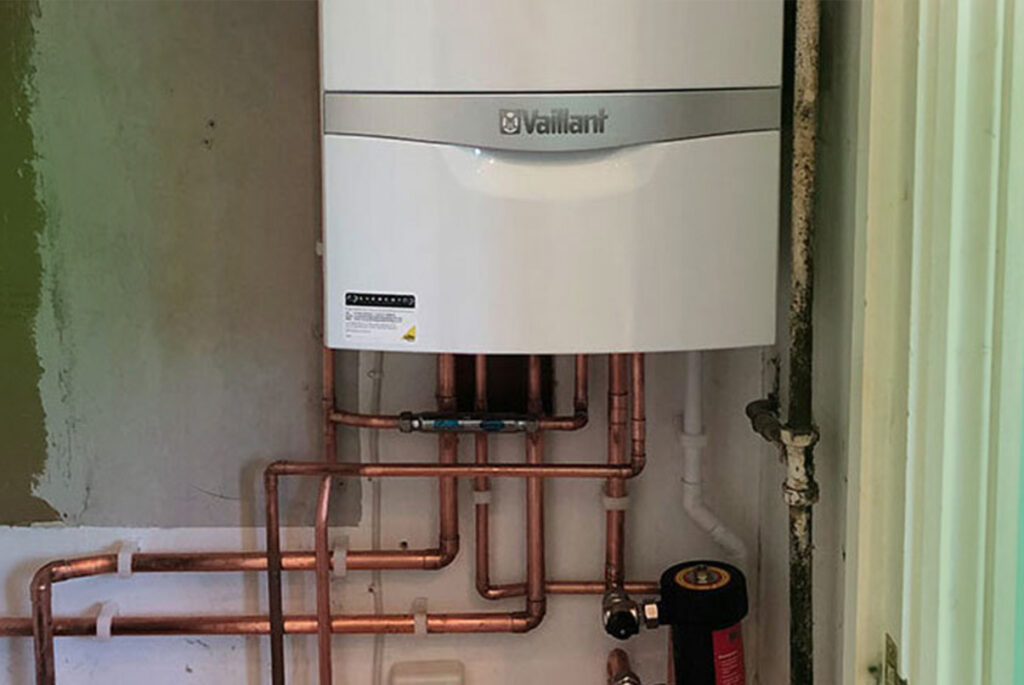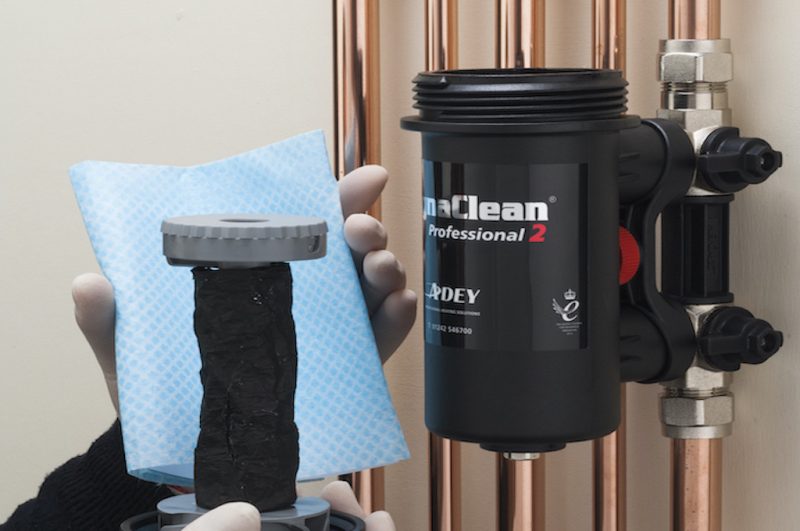Table of Contents
A magnetic filter is a tool for gathering magnetic debris in a heating system. Over time, rust and corrosion develop in pipes. As a result, debris peels off, merging with others to create sludge. Next, this sludge can lead to blockages and system problems. So it reduces efficiency and possibly causes breakdowns. Now where to put a magnetic boiler filter is the most important thing to know. We’ll address this question later in this blog. But, first of all, we should know what a magnetic filter for the heating system is and why it is needed.
Without a doubt, a magnet filter catches rusty bits in the water so they don’t build up. This keeps the water flowing smoothly and helps the system work well for a long time.
Why magnetic boiler filter is needed?
Determining the need for magnetic filters for boilers involves recognizing specific indicators for improved system efficiency. These signs encompass:
- Cold spots on radiators indicate potential sludge blockage, noticeable by top-cool and bottom-warm radiators.
- Unusual boiler noises like gurgling or banging signal the presence of accumulated sludge.
- Regular leaks may be linked to a sludge-related problem.
- Temperature-related issues, such as insufficient hot water or heating, can be influenced by the system’s water quality.
Neglecting these problems can escalate boiler damage. They may result in higher bills or even necessitate costly repairs or a new boiler. So to address these concerns, a magnetic filter proves beneficial. However, substantial build-up may require a system cleanse. So it is a task best handled by a qualified heating engineer.

How does a magnetic boiler filter work
Firstly, we should know that a magnetic filter is a device that separates and filters impurities, like fine iron, from the water in your central heating system. Next, if you know where to put a magnetic boiler filter in the central heating system, this job will be easy for you. Fundamentally, magnetic filters for boilers are connected to the water side of the central heating system. As a result, they strongly gather and store particles that would otherwise settle at the boiler’s bottom.
Over time, water in radiators and pipes causes rust. As rust mixes with dirt, it forms sludge-like mud. Consequently, this sludge can cause problems in the central heating system. You’ll experience leaks and pump failure. So to prevent these issues, install a magnetic filter. Further, it captures and removes metallic particles. Moreover, and some models handle other debris due to their gravity filter design.
When do you need magnetic boiler filter?
Now, if you already have a central heating system, it will be easy for you to address the question of where to put a magnetic boiler filter. But if your boiler is new, install a magnetic boiler filter when:
- You observe water pooling or leaks under the boiler.
- Mud-like dirt appears in broken heating parts.
- Frequent pump failures occur.
- The boiler fails to heat properly or overheats.
- Unusual noises, like bubbling or gurgling, come from the radiator or boiler.
- Tap water appears cloudy.
- Radiators have cold spots, or the boiler’s bottom is cool while the top is hot.
- The boiler shuts down on its own.
These signs may indicate sludge in your heating system. So contact a heating engineer promptly to avoid potential issues that could lead to buying a new boiler.
How can I install a magnetic boiler filter?
To have a magnetic boiler filter, follow these instructions:
- Initial Installation: Most boilers come with a filter during their first installation. In 2022, Building Regulations were updated to include boiler filters, making it mandatory for new boiler installations.
- Retrofitting Possibility: While more common in new boilers, retrofitting is feasible in some cases. But it depends on your boiler’s location and available space behind it.
- Installation Location: The boiler filter is placed on the return pipe, responsible for bringing water back into the boiler. This requires cutting a section of the pipe. So don’t opt for DIY. Engage a Gas Safe registered engineer.
Top Central Heating System Magnetic Filters: Your Options Ranked
When selecting a magnetic filter for your boiler, these options are highly regarded. Discover why these filters are popular to make the right choice for your heating system. Now, each brand has its specifications. Moreover, their prices vary. So choose the one that suits you best. Consult an engineer before purchasing.
Adey Magnaclean 2 System Cleaner
- It cuts your heating bills by 6% annually.
- Immediate protection for the central heating system.
- Bi-directional flow offers flexible port options.
- Reduces carbon emissions.
- In-line installation in under two minutes.
- Boosts central heating system lifespan.
- Low-profile drain valve for easy servicing and dosing.
- It has a 10-year warranty.
Fernox TTF1 Omega
- It has a compact design and high capacity. It can be used in both restricted and accessible areas.
- The filter is easy to install on horizontal and vertical pipes, in both flow directions. Moreover, it operates at a 45-degree angle.
- Cleaning the unit is quick and easy without disassembly.
- Its unique action removes both magnetic and non-magnetic contaminants from system water.
- The slip socket is easy to fit with compression fittings and a short pipe length. It does not restrict or block the flow.
- Constructed with nickel plating and smart, tough forged brass, it has no hidden porosity. The unique manifold features double radial seals, multiple orientation capabilities, and a distinctive design.
- It includes a neodymium magnet with a powerful threaded cap.
Worcester Bosch Greenstar Magnetic Filter
- It boasts an over-tightening prevention feature.
- It includes isolation valve indicators and supports bi-directional flow.
- Equipped with a stronger magnet, it has received positive feedback from installers.
- This product is designed for easier installation and servicing.
- You can use both magnetic and non-magnetic filters to capture various system debris.
- It offers flexibility, allowing installation under, above the boiler, or remotely.
- A one-way valve facilitates the easy addition of system chemicals. Indicators for the isolation valve aid visual isolation of the filter.
- For power flushing and service ease, body attachment is possible. The drainage point is conveniently located at the bottom.
- It comes with a 2-year guarantee.
Plumbright Systems Filter
- It actively removes sludge, iron, and rust with its powerful 11,000 Gauss Neodymium Magnet.
- It can handle high temperatures, up to 90 degrees Celsius.
- Plus, it’s easy to use with features like a manual air bleed and a full-bore drain valve.
- The filter has a 400ml dosing capacity and includes plastic magnets in its design.
- It’s flexible with a 360-degree installation.
- Meet the Boilermag Domestic Filter
- It’s a breeze to install or clean in just minutes.
- Enjoy years of protection with a guaranteed no-block feature.
- Thanks to dual-flow technology, it filters twice in one go.
- Plus, it can remove both magnetic and non-magnetic debris.
- Easy access to chemical dosing, and it boasts high-quality valves and seals.
- Simply fit it in line, and it allows for a 360-degree adjustment for your convenience.
How to clean a magnetic boiler filter?
To maintain your boiler, regularly clean the filter to remove collected debris. Typically part of the annual service, no action is required between services unless you suspect a filter issue. However, seek expert opinion if needed. Moreover, you cannot clean a magnetic boiler filter yourself. It’s a task for a professional heating engineer. So be careful and aware of potential problems that will occur if you opt for DIY.

Choosing the best magnetic filters for long-term performance
To choose the best magnetic boiler filter, prioritize effectiveness for optimal heating. Issues arise due to sludge formed by rust, dirt, and debris in pipes. These issues impact radiators. So bleeding radiators help reveal if sludge is the central heating problem. Additionally, frequent bleeding suggests potential sludge, especially if the water looks cloudy. Next, clear water after bleeding is good. But constant cloudiness may indicate a covered warranty issue. But overall, a magnetic filter helps keep the boiler clean. It saves you costs over time. So the ideal filter collects both magnetic and non-magnetic particles. It ensures thorough debris removal.
So consider your boiler type, warranty, and installation costs when choosing. Some brands offer extra features like a scale inhibitor or limescale reducer for better cleaning. This inhibitor prevents buildup, ensuring smooth water flow. So discuss these options with your heating engineer.
What's the lifespan of a magnetic filter for a heating system?
First, most magnetic filters for boilers have a lengthy lifespan. If you maintain them properly, they can work efficiently for 10 years. But always follow maintenance instructions before using any magnetic boiler filter. It is significant for longevity. What’s more, manufacturer guidelines prevent setup errors. They affect filter lifespan. So it’s advisable to have a heating engineer or plumber install the filter. A certified professional will ensure the correct setup and assess whether installing a magnetic filter or buying a new boiler is fit for your existing system.
Where do you put a magnetic boiler filter?
Finally, now we’ll answer the question of where to put a magnetic boiler filter. Well, as discussed earlier, a magnetic boiler filter is a device for your central heating. So your installer knows very well where to put a magnetic boiler filter. The fore and foremost location is your pipe where the water returns after going through the heating system. It helps keep your system clean.
Conclusion
To sum up, knowing where to put a magnetic boiler filter is important for a better heating system. Generally, installers place it right on the return pipe. This helps remove waste efficiently. In addition, this is key for magnetic filters in boilers to work well. So whether it’s a magnetic boiler filter or one for your heating system, proper placement ensures they do their job effectively.
FREE ELIGIBILITY CHECKER







